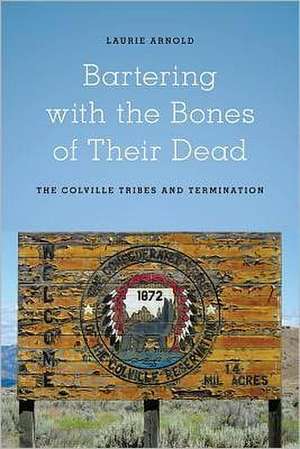Bartering with the Bones of Their Dead – The Colville Confederated Tribes and Termination: Bartering with the Bones of Their Dead
Autor Laurie Arnolden Limba Engleză Paperback – 14 dec 2012
Preț: 224.72 lei
Nou
Puncte Express: 337
Preț estimativ în valută:
43.01€ • 44.73$ • 35.50£
43.01€ • 44.73$ • 35.50£
Carte tipărită la comandă
Livrare economică 14-28 aprilie
Preluare comenzi: 021 569.72.76
Specificații
ISBN-13: 9780295992280
ISBN-10: 029599228X
Pagini: 208
Ilustrații: , black & white halftones, maps, figures
Dimensiuni: 168 x 227 x 12 mm
Greutate: 0.34 kg
Editura: MV – University of Washington Press
Seria Bartering with the Bones of Their Dead
ISBN-10: 029599228X
Pagini: 208
Ilustrații: , black & white halftones, maps, figures
Dimensiuni: 168 x 227 x 12 mm
Greutate: 0.34 kg
Editura: MV – University of Washington Press
Seria Bartering with the Bones of Their Dead
Recenzii
"Bartering with the Bones of Their Dead is a significant contribution to the field of 20th-century American Indian policy studies. Laurie Arnold's historical case study of her own tribal community's fractured reaction to federal termination efforts provides a nuanced view of American Indian responses to the difficult issues they faced. Arnold does a masterful job piecing together a complex and painful era of Colville history. In doing so, she broadens our understandings of intra-tribal decision making and local impacts of federal initiatives." David R. M. Beck, author of Seeking Recognition: The Termination and Restoration of the Coos, Lower Umpqua and Siuslaw Indians, 1855-1984
"Bartering with the Bones of Their Dead is a significant contribution to the field of 20th-century American Indian policy studies. Laurie Arnold's historical case study of her own tribal community's fractured reaction to federal termination efforts provides a nuanced view of American Indian responses to the difficult issues they faced. Arnold does a masterful job piecing together a complex and painful era of Colville history. In doing so, she broadens our understandings of intra-tribal decision making and local impacts of federal initiatives." David R. M. Beck, author of Seeking Recognition: The Termination and Restoration of the Coos, Lower Umpqua and Siuslaw Indians, 1855-1984
"Bartering with the Bones of Their Dead is a significant contribution to the field of 20th-century American Indian policy studies. Laurie Arnold's historical case study of her own tribal community's fractured reaction to federal termination efforts provides a nuanced view of American Indian responses to the difficult issues they faced. Arnold does a masterful job piecing together a complex and painful era of Colville history. In doing so, she broadens our understandings of intra-tribal decision making and local impacts of federal initiatives." David R. M. Beck, author of Seeking Recognition: The Termination and Restoration of the Coos, Lower Umpqua and Siuslaw Indians, 1855-1984
Notă biografică
Cuprins
Preface
Acknowledgments
1. ¿We want to be Indians forever.¿
2. ¿It is like giving your eagle feather away.¿
3. ¿Soon buried in a junk pile of Cadillacs.¿
4. ¿What is their future?¿
5. ¿Come back from your pilgrimage to nowhere.¿
6. ¿Not another inch, not another drop.¿
Conclusion: ¿We kept getting a little bit smarter.¿
Appendix: Major Legislation Affecting the Colville Confederated Tribes
Notes
References
Index
Descriere
Tells the story of a tribe whose members waged a painful and sometimes bitter twenty-year struggle among themselves about whether to give up their status as a sovereign nation












